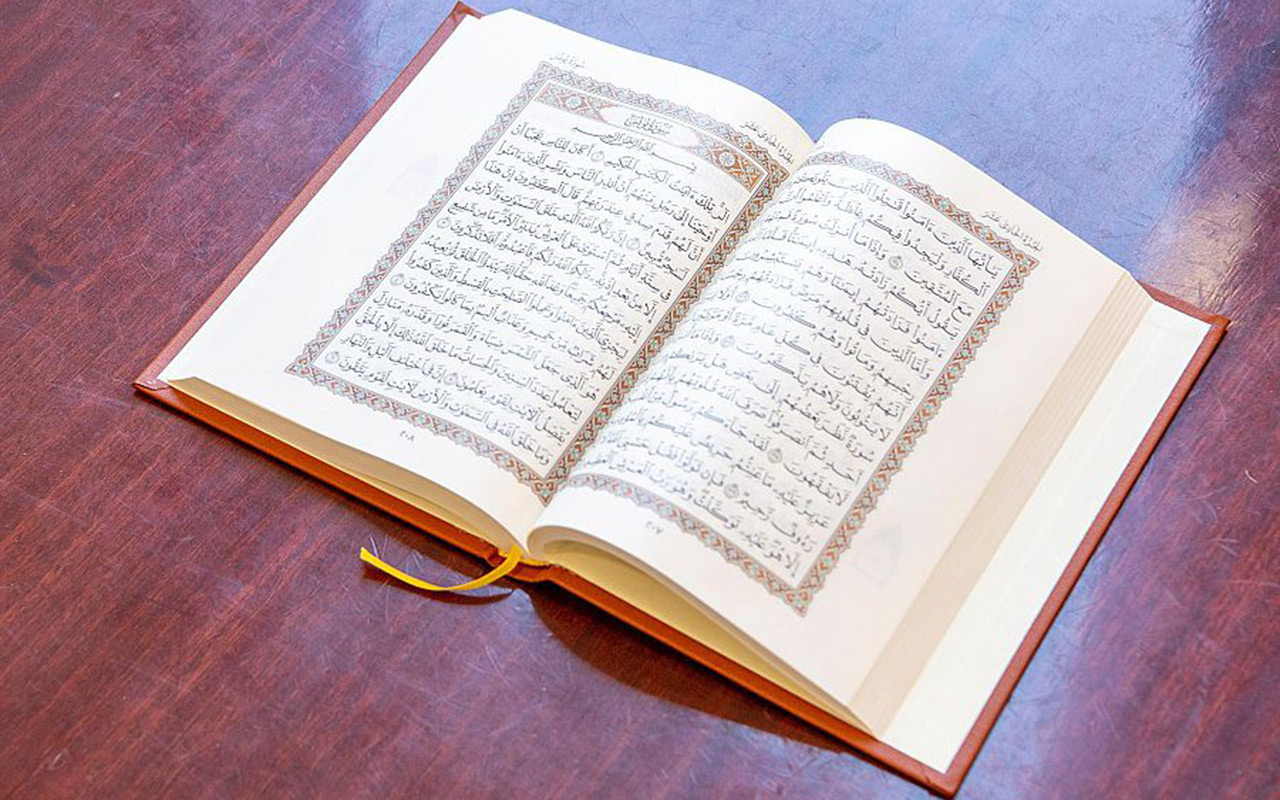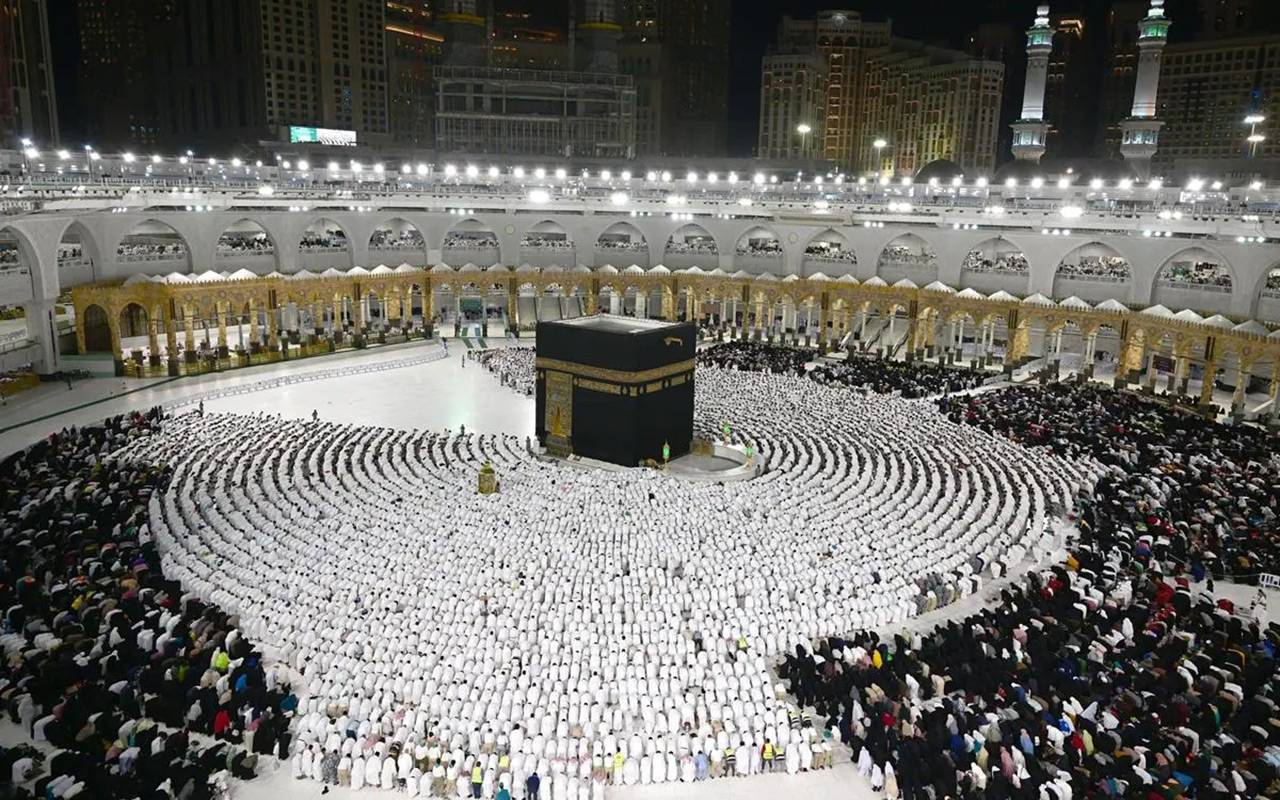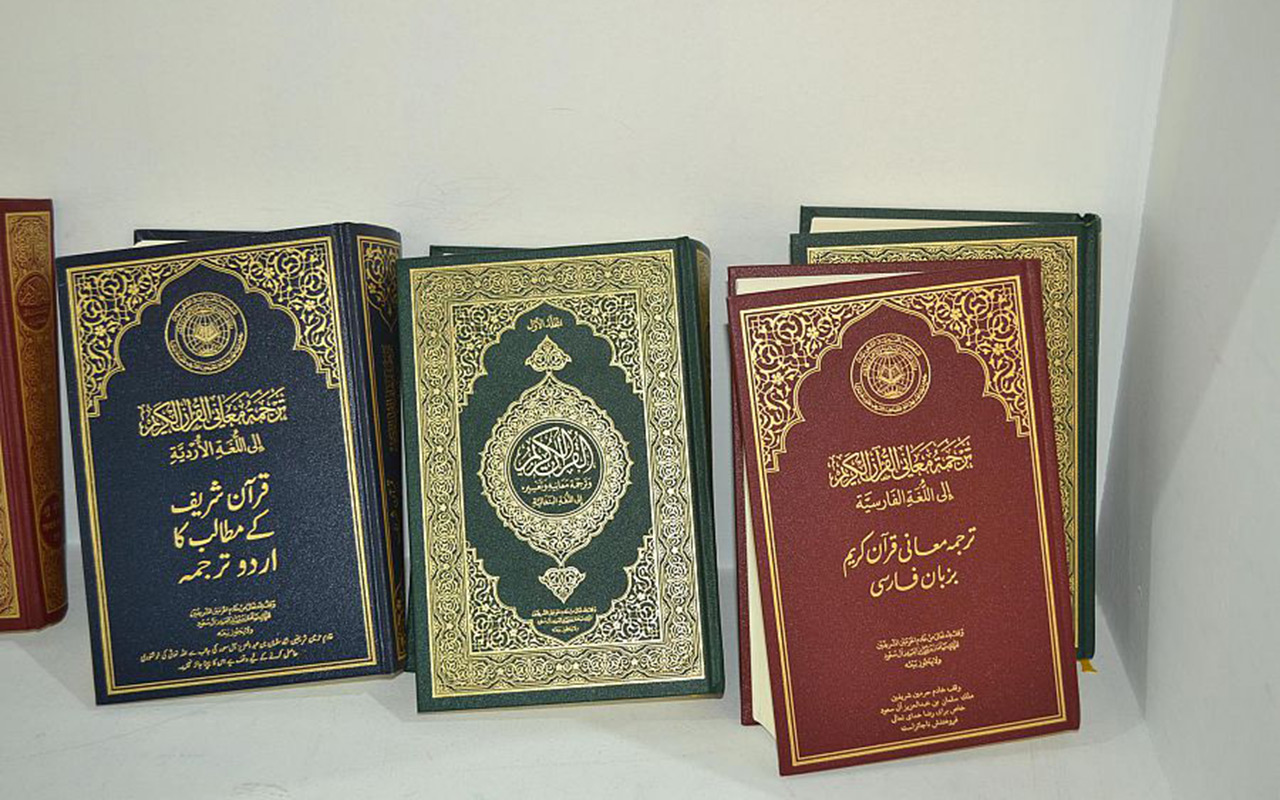Islam
Islam is the final of the heavenly messages, sent by the Seal of the Prophets and Messengers, Muhammad, peace be upon him (PBUH), who called for the worship and oneness of Allah. Its sacred scripture is the Holy Quran. It is embraced by around two billion Muslims worldwide, known for adhering to its teachings and Sharia, and countries that base their legislation and laws on Islam are referred to as 'Islamic states'.
The emergence of Islam
The first emergence of Islam was in Makkah al-Mukarramah, where the Muslims' al-Kaaba al-Musharrafa is located, situated in the center of the Grand Mosque. Makkah al-Mukarramah City is located in the western region of the Kingdom of Saudi Arabia.
Prophet of Islam
Allah sent His Prophet Muhammad with the Islamic religion after the spread of misguidance, to guide people back to the right path by affirming the oneness of Allah, believing in His messengers and prophets, as well as having faith in them, and inviting them to worship Allah alone.
The descent of revelation
The history of Islam began when Prophet Muhammad (PBUH) received his revelation in Ghar Hira in Makkah al-Mukarramah at the age of forty. He spent three years secretly calling people to it before publicly declaring his mission. He continued to do so for ten years before migrating to al-Madinah al-Munawwarah.
The people of al-Madinah converting to Islam
The Prophet Muhammad (PBUH) found support in his early days from a group of people in Makkah, later known as Muhajirun (Emigrants) because they migrated to al-Madinah. Then he found support from a group of people from Yathrib (later known as al-Madinah), who became known as the Ansar (Supporters) because of this. The Prophet presented Islam to them at al-Aqabah in Mina, inviting them to it, and they embraced Islam. Then, they returned to al-Madinah and invited their people to Islam. Thus, Islam grew until every household embraced Islam.
The Ansar, the people of al-Madinah, embraced Islam, and the Messenger Muhammad (PBUH) successfully accomplished, within ten years of his migration to al-Madinah, the establishment of a nation, a religion, legislation, the nurturing of a generation, and the foundation of an Islamic civilization that flourished for centuries and endures to this day.

Sources of Islamic legislation
The Holy Quran is the primary source of legislation in Islam, followed by the Prophetic Sunnah, which encompasses the actions and worship practices, statements, and humanitarian and social principles attributed to the Prophet Muhammad (PBUH). Then comes the consensus of scholars and analogical reasoning.
The Holy Quran
The Holy Quran holds immense importance for Muslims because it is considered the word of Allah Almighty revealed to His Messenger Muhammad (PBUH). Reciting it is among the most rewarding deeds, leading to Allah's pleasure and entry into paradise. Muslims recite from it in their five daily prayers, and it contains many Sharia rulings, acts of worship, stories of past prophets and their peoples, guidance on interactions between Muslims and their Lord, as well as how to deal with other people, including urging humility towards elders, kindness towards parents, and compassion towards the weak.
Prophetic Sunnah
The Prophetic Sunnah comprises every saying, action, or consent attributed to Prophet Muhammad (PBUH). He is considered the role model for Muslims and their messenger sent by Allah to teach them the rulings of their religion, guide them to the best of manners, and forbid them from evil deeds and immoral actions.
The sanctities of Islam
In Islam, there are three holy mosques: the Grand Mosque in Makkah al-Mukarramah, the Prophet's Mosque in al-Madinah al-Munawwarah, and al-Aqsa Mosque in Jerusalem.
Makkah al-Mukarramah
Makkah al-Mukarramah is where the call to Islam originated from Prophet Muhammad (PBUH). It encompasses the Holy Sites and the Grand Mosque, with al-Kaaba al-Musharrafa at its center, which is the first house built for humanity and the Qibla for Muslims, toward which they turn in prayer every day, and which they visit as Hajj and Umrah performers.
Al-Madinah al-Munawwarah
Al-Madinah al-Munawwarah is the second holiest city in Islam. Prophet Muhammad (PBUH) migrated to it, lived, and was buried there. It houses the Grand Mosque and witnessed the formation of Islam in all its five pillars. Muslims visit it to pray in its sanctuary and to visit Prophet Muhammad (PBUH). Al-Madinah al-Munawwarah is located in the western part of the Kingdom.
Al-Aqsa Mosque
Al-Aqsa Mosque in Palestine represents the third holiest mosque for Muslims. The reward for prayer there is multiplied to five hundred prayers. Prophet Muhammad (PBUH) was transported there from the Grand Mosque. It is located in the city of Jerusalem.
Pillars and levels of Islam
The five pillars of Islam
Islam has five pillars, which are: bearing witness that there is no god but Allah and that Muhammad is the Messenger of Allah, performing the five daily prayers, fasting during the month of Ramadan, giving Zakat to those in need, and performing the Hajj pilgrimage to Makkah al-Mukarramah for those who are able to do so.
Levels of the Islamic religion
In Islam, there are three levels: Islam, then Iman (faith), which is higher than Islam, and finally Ihsan (spiritual excellence), which is considered the highest level of religion.

Acts of Worship in Islam
Five obligatory prayers are enjoined upon Muslims, to be performed by every mature, sane Muslim every day and night. These prayers are directed towards al-Kaaba al-Musharrafa in the Grand Mosque of Makkah al-Mukarramah, located in the west of the Kingdom, specifically to the Qibla. Prayer can be performed in any clean place at the specified times. Muslims undertake the pilgrimage to Makkah al-Mukarramah during specific days of the month of Dhu al-Hijjah each Hijri year, and they fast during the days of the month of Ramadan, from dawn until sunset. Additionally, they give a portion of their wealth to the poor and needy every year, known as Zakat.
Muslims live their lives according to Sharia rulings derived from the Holy Quran and the Prophetic Sunnah, known as Islamic Fiqh (jurisprudence). These rulings elucidate the relationship of a servant with their Lord through acts of worship and their relationship with others through transactions.
Ethics of Islam
The Prophet of Islam left no good without indicating it and no evil without warning against it. The religion of Islam is distinguished by profound wisdom, compelling arguments, and noble goals in all its legislative rulings for its followers from all segments of society.
The Holy Quran and the noble hadith emphasize the importance of ethics. Allah Almighty addressed His Prophet, saying, 'And indeed, you are of a great moral character.' (Surah al-Qalam, 68:4) Prophet Muhammad (PBUH) also said, 'I was only sent to perfect noble character.'
Among the teachings of Islam is the invitation to people to uphold noble ethics and virtuous deeds, and to remain steadfast in actions that are beloved and pleasing to Allah Almighty. Islam also warns against sinful deeds and bad morals.
Islam, in the Holy Quran and the Prophetic Hadiths, calls for belief in Allah and His messengers. It emphasizes the importance of generosity, spending in charity, selflessness, and kindness, along with honesty, righteousness, and Ihsan in speech and action. Islam urges against lying and hypocrisy, and encourages spreading love, enjoining good deeds, and cooperating in righteousness and piety while condemning backbiting, envy, quarreling, cheating, betrayal, and false witnessing.
Islam emphasizes promoting the behaviors of promotion of virtue and prevention of vice, urging its followers to achieve them in their daily lives through virtuous ways and good methods. Several verses from the Holy Quran illustrate this, such as Allah Almighty's statement in Surah Yusuf: "Say, 'This is my way; I invite to Allah with insight, I and those who follow me.' (Yusuf: 108), and Allah's statement in Surah al-Imran: "And let there be [arising] from you a nation inviting to [all that is] good, enjoining what is right and forbidding what is wrong, and those will be successful." (Al-Imran: 104).
Islam emphasizes the importance of fulfilling trustworthiness and not concealing testimony. It also calls for five necessities, which are: preserving life, intellect, wealth, religion, and honor. Islam also praises submission to Allah, humility towards people, steadfastness in speech and action, patience in times of adversity, and humility and tranquility in worship.
Saudi Arabia’s support for Islam
The first article of the Basic Law of Governance in the Kingdom states that the Kingdom is a sovereign Arab Islamic State. Its religion is Islam, and its constitution is the Quran and the Sunnah of the Prophet (PBUH).
The Kingdom, through its Ministry of Islamic Affairs, Dawah, and Guidance, works on inviting people to Islam and directing them towards it by expanding the issuance of Islamic books and deepening bonds of love among nations. This is to showcase the ideals and noble values of the Islamic religion, aiming to achieve more peace and justice in the Islamic world and around the globe.
The Kingdom makes efforts to organize international events that support humanitarian issues at the Islamic world level and among other friendly countries from various parts of the globe. It also holds lectures and seminars and utilizes modern media and information technologies to promote the virtues and merits of Islam. This is done through several specialized preachers in Sharia sciences and influencers within the Kingdom, both domestically and internationally.
The Ministry of Islamic Affairs, Dawah, and Guidance in the Kingdom publishes several books on Islam and its rulings in multiple languages and makes them available for download electronically to all those interested in learning about the principles of the Islamic religion, its rulings, and the ethics advocated by the Holy Quran and the noble Prophetic Hadiths. Additionally, it prints large quantities of these books for visitors, Umrah performers, and Islamic centers at entry and exit ports in the Kingdom. Furthermore, it supports Islamic centers worldwide and in Muslim minority countries with these publications.

Saudi Arabia’s interest in spreading the Quran
The Holy Quran, representing the sacred book of Muslims, garners significant interest in the Kingdom. This interest extends to its recitation, intonation (Tajweed), memorization, understanding, and publication. This is evident in its continuous printing of the Quran at the King Fahd Glorious Quran Printing Complex. Additionally, the Kingdom supports the dissemination of Quranic sciences and everything related to the noble Prophetic Sunnah. It sponsors and supports associations specialized in Quran memorization, and encourages the use of services dedicated to Quran memorization, Tajweed, learning its rulings, and taking care of it. Furthermore, it organizes several local and international competitions in the fields of the Quran and the Prophetic Sunnah.
The King Fahd Glorious Quran Printing Complex is one of the Kingdom's arms for disseminating Islam and its rulings. It translates the meanings of the Quran into more than seventy-seven languages and publishes the Quran in various scripts. Additionally, it issues versions tailored for computers, phones, and sign language.
The King Fahd Glorious Quran Printing Complex provides pilgrims with a copy of the Holy Quran, and it offers various sizes suitable for different age groups. Larger print sizes are particularly helpful for those with visual impairments and elderly individuals, aiding them in reading and distinguishing the letters and words of the Quran.
Organization of Islamic Cooperation
At the global level, the Organization of Islamic Cooperation (OIC) serves as the international body concerned with Islamic issues, supporting and defending its interests within the framework of promoting peace and enhancing relations between Islamic countries and the rest of the world. It is the largest international organization after the United Nations, with fifty-seven member states across four continents.
Jeddah City, in the Kingdom, serves as the official headquarters of the organization. It hosted the first Islamic conference of foreign ministers in 1970.